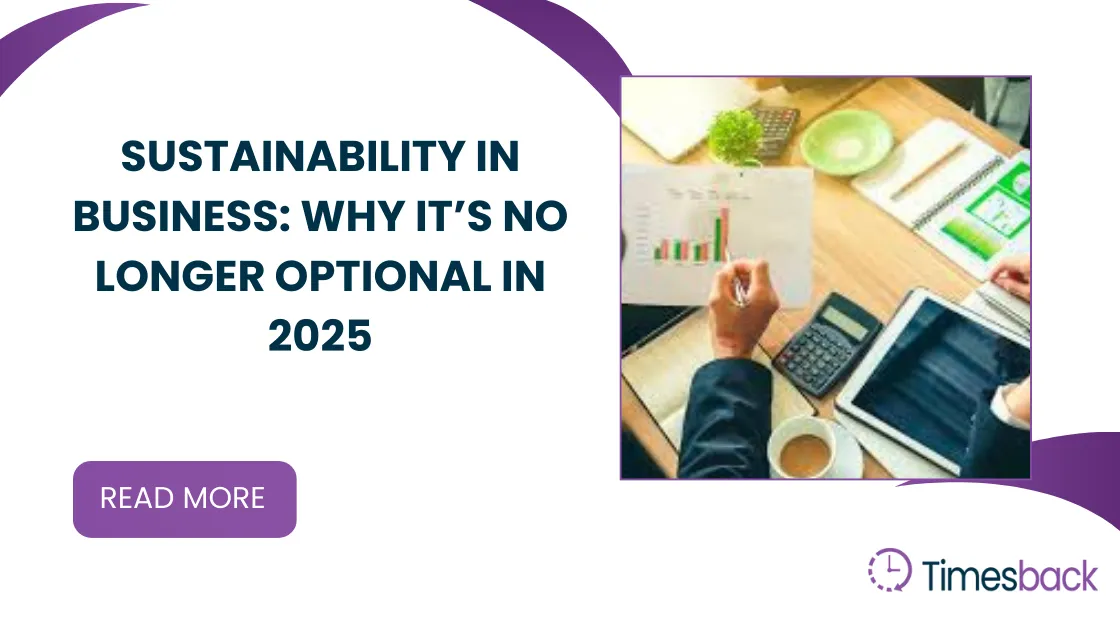Sustainability in Business: Why It’s No Longer Optional in 2025

In 2025, sustainability in business isn’t just a trend—it’s a necessity.
Anúncios
Consumers, investors, and regulators are demanding accountability, pushing companies to rethink operations, supply chains, and long-term strategies.
A 2024 McKinsey report revealed that 83% of C-suite leaders believe sustainability directly impacts shareholder value, proving that green practices are now a competitive advantage, not just ethical PR.
The question isn’t whether to adopt sustainable models but how to implement them effectively.
Anúncios
From carbon-neutral pledges to circular economies, businesses that ignore this shift risk obsolescence.
Below, we explore why sustainability in business is non-negotiable—and how forward-thinking companies are thriving because of it.
Moreover, the urgency of sustainability is underscored by climate change and resource scarcity.
Companies that proactively embrace sustainable practices not only mitigate risks but also unlock new opportunities for growth and innovation.
As we move deeper into 2025, the integration of sustainability into core business strategies will define market leaders.
This shift is not merely reactive; it’s a proactive approach that positions companies for future success.
Investing in sustainability can also lead to enhanced brand reputation, making companies more attractive to consumers and investors alike.
As public awareness of environmental issues grows, so does the expectation for businesses to act responsibly.
The Triple Bottom Line: Profit, People, Planet
Gone are the days when profit alone defined success.
The modern corporate mantra—People, Planet, Profit—reflects a fundamental shift.
Consumers increasingly support brands that align with their values, with 66% of global shoppers willing to pay more for sustainable goods (NielsenIQ, 2023).
Why Sustainability Equals Profitability
- Cost Efficiency: Renewable energy and waste reduction cut long-term expenses.
- Investor Appeal: ESG (Environmental, Social, Governance) funds hit $41 trillion in assets in 2024.
- Brand Loyalty: Transparent sustainability efforts boost customer retention by up to 60%.
| Traditional Model | Sustainable Model |
|---|---|
| Short-term profit focus | Long-term value creation |
| Linear production | Circular supply chains |
| High regulatory risk | Compliance as an advantage |
The data is clear: sustainability in business isn’t a cost—it’s an investment.
Additionally, companies that prioritize sustainability often see an increase in employee engagement and retention.
This holistic approach not only benefits the bottom line but also fosters a positive workplace culture that attracts top talent.
Moreover, integrating sustainable practices into corporate strategy can lead to innovative product development.
When companies focus on sustainability, they often discover new markets and customer segments eager for eco-friendly options.
As organizations embrace this mindset, they foster a culture of innovation that drives continuous improvement.
This commitment not only enhances profitability but also contributes to a more sustainable future for all.
+ How to Stay Productive While Running Your Own Business
Regulatory Pressure: The Legal Imperative
Governments worldwide are enforcing stricter sustainability mandates.
The EU’s Corporate Sustainability Reporting Directive (CSRD) now requires detailed ESG disclosures, while the U.S. SEC’s climate disclosure rules push transparency.
Non-compliance means fines, but more critically, reputational damage.
Key Regulations Shaping 2025
- Carbon Taxes: 40+ countries now penalize high emissions.
- Supply Chain Laws: Germany’s Supply Chain Act mandates ethical sourcing.
- Greenwashing Penalties: The FTC fined companies $5M+ in 2024 for misleading eco-claims.
Businesses that adapt early avoid disruption—and gain first-mover advantages.
Staying ahead of regulatory changes can also enhance brand reputation and consumer trust.
Moreover, organizations that proactively engage with regulators can influence policy development.
By participating in dialogues and offering insights, companies can help shape regulations that benefit both the environment and their industry.
This proactive stance not only mitigates risks but also positions businesses as leaders in sustainability.
As regulations evolve, those who adapt quickly will be better positioned to thrive in a changing landscape.

Innovation as a Catalyst
Sustainability drives innovation.
Tesla’s electric vehicles disrupted auto giants, while Patagonia’s recycled materials set industry benchmarks.
Startups like Beyond Meat prove that eco-conscious products can dominate markets.
Breakthrough Sustainable Technologies
- AI for Energy Optimization: Google cut data center energy use by 40% with DeepMind AI.
- Biodegradable Packaging: Mushroom-based and seaweed alternatives replace plastics.
- Carbon Capture: Microsoft’s $1B initiative aims to be carbon-negative by 2030.
| Industry | Sustainability Innovation |
|---|---|
| Fashion | Lab-grown leather, waterless dyeing |
| Agriculture | Precision farming, vertical crops |
| Tech | Energy-efficient blockchain solutions |
The lesson? Sustainability in business fuels R&D—and revenue.
Innovative companies are not just responding to consumer demand but are also shaping new markets and industries.
By investing in sustainable technologies, businesses can create a competitive edge that drives long-term success.
This investment in innovation also opens doors for collaboration with tech startups and research institutions.
Furthermore, organizations that prioritize sustainability often attract talent eager to work on meaningful projects.
This alignment of purpose can lead to breakthroughs that not only benefit the company but also society at large.
The Consumer Revolution
Modern buyers vote with their wallets.
Gen Z and Millennials, who will comprise 72% of the workforce by 2025, prioritize purpose-driven brands.
A 2023 IBM study found that 57% would boycott companies harming the environment.
How to Engage the Conscious Consumer
- Radical Transparency: Everlane’s “Price Breakdown” model builds trust.
- Sustainability Storytelling: IKEA’s “Buy Back” program highlights circularity.
- Community Impact: TOMS’ “One for One” remains a case study in ethical branding.
Ignoring these expectations means losing market share.
Engaging consumers through authentic storytelling and transparent practices can foster deeper connections and loyalty.
Brands that successfully communicate their sustainability efforts not only attract customers but also inspire them to advocate for the brand.
This word-of-mouth marketing can amplify a brand's reach and credibility.
Moreover, leveraging social media platforms to showcase sustainability initiatives can enhance engagement.
Consumers are increasingly looking for brands that share their values and actively participate in social causes.
By aligning marketing strategies with sustainability efforts, companies can create a strong emotional connection with their audience.
This connection not only drives sales but also builds a community of loyal supporters.
++ From Idea to Empire: 10 Steps to Launch Your Dream Business in 2025

The Road Ahead: Actionable Steps
1. Audit & Benchmark
Measure carbon footprints, supply chain ethics, and waste outputs.
Tools like EcoVadis provide actionable insights.
2. Set Science-Based Targets
Align with the Science Based Targets initiative (SBTi) for credible goals.
3. Partner for Scale
Collaborate with suppliers, NGOs, and even competitors (e.g., The Fashion Pact).
4. Communicate Authentically
Avoid greenwashing—highlight progress, not perfection.
Taking these steps not only enhances a company's sustainability profile but also positions it as a leader in the industry.
By fostering a culture of sustainability, organizations can engage employees and stakeholders in meaningful ways.
This collective effort will be crucial for achieving long-term goals and driving impactful change.
Additionally, establishing a sustainability task force can help maintain focus and accountability.
Regularly reviewing and updating sustainability strategies ensures that companies remain responsive to emerging trends and challenges.
This adaptability is key in a rapidly changing global landscape.
Final Thoughts
Sustainability in business is the defining challenge—and opportunity—of this decade.
Companies that embrace it will lead; those that don’t will lag.
The convergence of consumer demand, regulation, and innovation makes 2025 the tipping point.
The future belongs to businesses that recognize: doing good isn’t optional—it’s profitable.
As we move forward, the companies that prioritize sustainability will not only thrive but will also contribute to a healthier planet for future generations.
This commitment to sustainability will set the standard for future business practices.
Ultimately, the journey toward sustainability is not just a corporate responsibility; it’s a path toward a better world.
By taking action today, businesses can pave the way for a sustainable future that benefits everyone.
